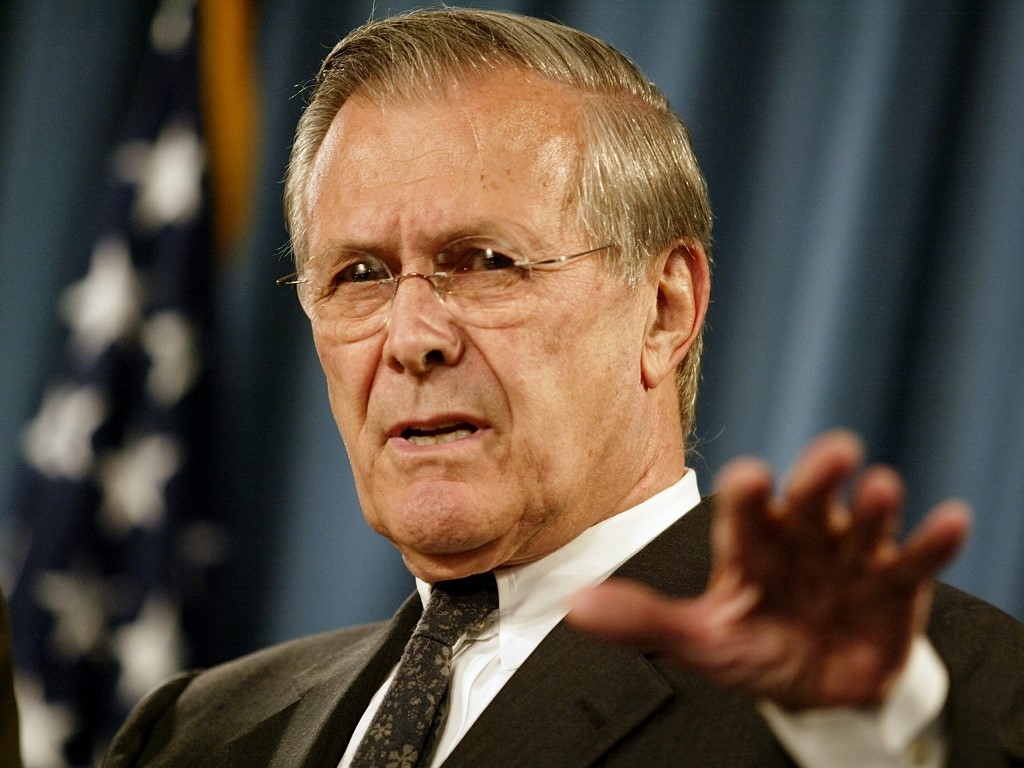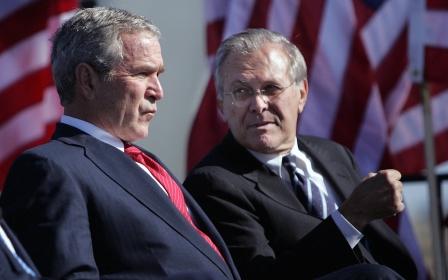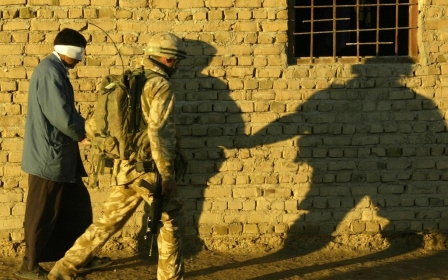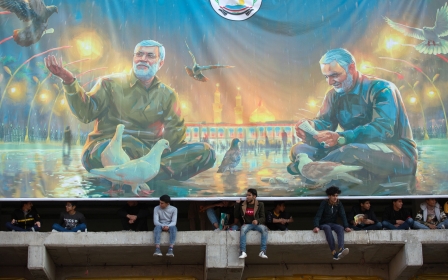'An absolute monster': Rumsfeld critics reflect on his life and death

Arguably one of those most influential public figures in contemporary American politics, Donald Rumsfeld, who died on Wednesday at the age of 88, left behind a legacy of war and torture that continues to be felt across the world.
While some are mourning his passing, others have reflected on decades of anguish caused by his role as one of the key architects of the United States' "war on terror".
"Rumsfeld gave the orders that resulted in the abuse and torture of hundreds of prisoners in US custody in Afghanistan, Iraq, and Guantanamo Bay. This should be at the top of every obituary," said Jameel Jaffer, director of the Knight First Amendment Institute at Columbia University, just after the death was announced.
Serving as secretary of defence under President George W Bush, Rumsfeld oversaw the 2001 invasion of Afghanistan that followed directly after the 9/11 attacks. In 2003 he helped coordinate the US invasion of Iraq, which saw nearly 200,000 US troops deployed to the Gulf state.
By the end of that year, then-Iraqi President Saddam Hussein had been captured, but the "weapons of mass destruction" that Rumsfeld famously insisted were being stockpiled by the fallen dictator were never found.
New MEE newsletter: Jerusalem Dispatch
Sign up to get the latest insights and analysis on Israel-Palestine, alongside Turkey Unpacked and other MEE newsletters
The US invasions quickly morphed into long-term operations, as more than 20 years later US forces remain in both Iraq and Afghanistan.
"Donald Rumsfeld was an absolute monster. My deep condolences to his victims in Iraq and Afghanistan because they did not have the opportunity to see him brought to justice for his horrific crimes," Ali Abunimah, author and co-founder of the Electronic Intifada, said of his passing.
It is estimated that the war on terror resulted in the deaths of hundreds of thousands of people, but the true number may never be known, as Rumsfeld directed the US military to not compile or release body counts.
A legacy of torture
What is fairly well documented at this point is the torture programme that Rumsfeld approved and helped develop during his tenure in the Bush administration.
George Zornick, a senior national editor at the Huffington Post, was one of many to share the Rumsfeld torture memo that he signed on 2 December 2002 authorising various methods of torture against some of the thousands of people the US had secretly captured post-9/11, the vast majority of whom were released without charge or trial.
At least 16 interrogation techniques were listed, including confronting a detainee with snarling dogs and forcing him to wear women’s underwear on his head.
At the bottom of the memo, Rumsfeld famously noted an objection to one of the limits listed by hand: "I stand for 8 to 10 hours a day. Why is standing limited to four hours?"
Several years later it would be revealed that US military and intelligence officials and private contractors had taken part in extreme methods of physical, sexual and psychological torture and humiliation after photos of the acts were leaked to the media, sparking alarm around the world.
Following an investigation in 2005, Anthony D Romero, executive director of the American Civil Liberties Union (ACLU), concluded that "there is no question that US interrogations have resulted in deaths" of detainees.
"High-ranking officials who knew about the torture and sat on their hands," Romero said, alluding to a conspiracy that we now know went all the way up to the head of the Defence Department.
The Guantanamo Bay prison camp - which he once referred to as a "world-class operation" - was also set up under Rumsfeld's watch, a facility that remains today where dozens of people are still imprisoned, most without charge or trial.
In the media
Underscoring his controversial legacy is the reaction to media coverage of Rumsfeld's death, as critics slam the Associated Press, Politico and others for humanising the former defence secretary, who spent most of his life in public service.
"Donald Rumsfeld was a merciless war criminal who presided over systemic torture, massacres of civilians, illegal wars. That's his legacy and how he should forever be remembered," Jeremy Scahill, co-founder of the Intercept tweeted.
Several conservative news outlets, such as Fox News and The Blaze, covered the amount of ridicule Rumsfeld had garnered in his death, with many zeroing in on a Daily Beast op-ed by journalist Spencer Ackerman, entitled, Donald Rumsfeld, Killer of 400,000 People, Dies Peacefully that begins: "The only thing tragic about the death of Donald Rumsfeld is that it didn't occur in an Iraqi prison".
Fox News quoted, among many other critics, Wajahat Ali, a political analyst who has written extensively on the American Muslim experience post-9/11, who described Rumsfeld as "an atrocious human being whose legacy is engineering unlawful, disastrous & unnecessary wars that continue to traumatize generations".
"He had no remorse or contrition for his role in the bloodshed. May he kick rocks for eternity," Ali wrote.
Later, he shared the Fox article, entitled, Liberals rejoice over Donald Rumsfeld's death, saying he was "proud to be included" among critics.
"Rumsfeld was a terrible man," Ali said.
Middle East Eye delivers independent and unrivalled coverage and analysis of the Middle East, North Africa and beyond. To learn more about republishing this content and the associated fees, please fill out this form. More about MEE can be found here.




